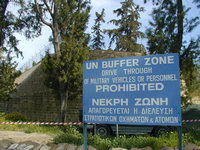At first glance, it is difficult to put a positive spin on hardliner Dervis Eroglu's victory in Turkish Cyprus' presidential elections on April 18. The result certainly challenges the future of negotiations to reunify the 1.1 million inhabitants of the Mediterranean island, 80 percent of whom are Greek Cypriots and 20 percent Turkish Cypriots. Eroglu, who has been prime minister of the self-declared Turkish Republic of North Cyprus for 19 of its 27 years, won just over 50 percent of the votes. President Mehmet Ali Talat, the pro-compromise incumbent whose pledge to solve the Cyprus problem had brought him to power in 2005, trailed with 43 percent.
In a conciliatory speech after the elections, Eroglu promised not to walk away from negotiations with Greek Cypriots that have been ongoing since September 2008, as well as to stick to longstanding U.N. parameters and to "seek a solution based on the realities of the island." Such a solution may be a long time coming, however, as Eroglu wants to re-examine all the issues that Talat and Greek Cypriot President Demetris Christofias have covered in the past two years. He is against some hard-fought, key convergences the two accomplished, such as cross-voting across ethnic lines, and has ruled out allowing Greek Cypriots to reclaim property in the north. Instead of supporting the "single sovereignty" basis for the negotiations, Eroglu is keen on "two sovereign peoples living in separate areas." He has in the past promoted a "velvet divorce," thus fueling worries that his real goal is an internationally recognized, independent Turkish Cypriot state.
Reunification talks are set to resume in May, and will probably go on for some time, at least for appearance's sake, because neither side wants to be blamed for failure. Shortly after Eroglu's win, Turkey's president, prime minister and foreign minister all called for the continuation of the talks from where they left off on March 30, and reiterated the goal of reaching a solution by the end of 2010.

